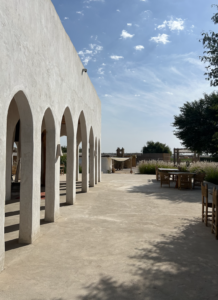Arriving in Qatar has been a whirlwind of cultural learning and discovery. After only a couple of days here one of the first things that stood out to me is the distinct role of gender in society. Women here are required to cover almost fully, a practice rooted in Islamic faith and cultural tradition. They wear thobes, thin and breathable robes that symbolize their faith and commitment. Public life is largely segregated by gender—men and women cannot do many routine tasks in the same room. For example they have their own spaces in Mosques as well as many other places, including gyms. These customs extend into social interactions, where women typically speak only with their husbands in public settings and often do not place orders at restaurants themselves.
This brought about many questions on the marriage customs in this country. Many marriages are arranged by families, and in some cases, couples don’t meet until their wedding day. Despite these traditional practices, divorce is a rarity, perhaps highlighting a strong sense of commitment. Gender roles here carry a deep sense of responsibility; men are expected to care for their families, financially supporting their wives and sisters if they choose not to work.
From a business perspective, the corporate structure in Qatar is unique. Companies are responsible for providing housing, transportation, food, and other expenses for their employees in addition to salaries. While this support system seems appealing, losing a job here means losing not only income but also housing and other essentials.
Racial dynamics also play a role in the workforce. Salaries are influenced by nationality, with Qataris earning the most, followed by Americans, and descending from there. Your passport often determines your pay.
This first week in Qatar has given me a profound appreciation for its traditions and complexities. It’s a society steeped in faith, family, and a distinct sense of order—offering invaluable lessons on culture and responsibility.


